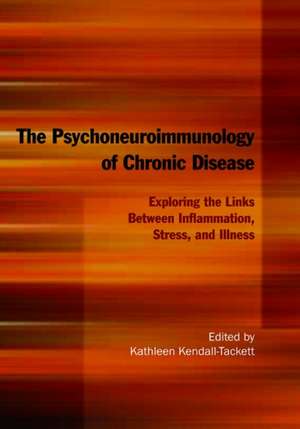The Psychoneuroimmunology of Chronic Disease – Exploring the Links Between Inflammation, Stress, and Illness
Autor Kathleen Kendall–tacketten Limba Engleză Hardback – 14 aug 2009
Preț: 364.57 lei
Preț vechi: 479.13 lei
-24% Nou
Puncte Express: 547
Preț estimativ în valută:
69.78€ • 75.82$ • 58.66£
69.78€ • 75.82$ • 58.66£
Carte indisponibilă temporar
Doresc să fiu notificat când acest titlu va fi disponibil:
Se trimite...
Preluare comenzi: 021 569.72.76
Specificații
ISBN-13: 9781433804762
ISBN-10: 143380476X
Pagini: 264
Dimensiuni: 179 x 258 x 24 mm
Greutate: 0.72 kg
Editura: Wiley
ISBN-10: 143380476X
Pagini: 264
Dimensiuni: 179 x 258 x 24 mm
Greutate: 0.72 kg
Editura: Wiley
Cuprins
Contributors
Foreword
Janice Kiecolt-Glaser
Introduction
Kathleen Kendall-Tackett
Part I: The Role of Inflammation in Disease Process
Chapter 1: An Overview of Stress and Immunity
Maureen Groër, Mary W. Meagher, and Kathleen Kendall-Tackett
Chapter 2: Inflammation, Fatty Acid Oxidation, and Neurodegenerative Disease
Mary Nivison, Angela L. Guillozet-Bongaarts, and Thomas J. Montine
Chapter 3: Sleep and Inflammation: A Potential Link to Chronic Diseases
Edward C. Suarez and Harold Goforth
Chapter 4: Polyunsaturated Fatty Acids, Inflammation, and Inflammatory Diseases
Philip C. Calder
Part II: The Link Between Stress, Inflammation, and Disease
Chapter 5: Depression, Hostility, Posttraumatic Stress Disorder, and Inflammation: The Corrosive Health Effects of Negative Mental States
Kathleen Kendall-Tackett
Chapter 6: Cognitive and Behavioral Reactions to Stress Among Adults With PTSD: Implications for Immunity and Health
Jeffrey L. Kibler, Kavita Joshi, and Erin E. Hughes
Chapter 7: Social Stress and Inflammation in the Exacerbation of Multiple Sclerosis: An Animal Model With Implications for Humans
Mary W. Meagher and C. Jane R. Welsh
Chapter 8: Allostasis: A Model for Women's Health
Maureen Groër and the Women's Health Research Group at the University of South Florida College of Nursing
Chapter 9: Treatments for Depression That Lower Inflammation: Additional Support for an Inflammatory Etiology of Depression
Kathleen Kendall-Tackett
Epilogue: Inflammation and Chronic Disease: Clinical Implications and Future Directions
Kathleen Kendall-Tackett
Index
About the Editor
Foreword
Janice Kiecolt-Glaser
Introduction
Kathleen Kendall-Tackett
Part I: The Role of Inflammation in Disease Process
Chapter 1: An Overview of Stress and Immunity
Maureen Groër, Mary W. Meagher, and Kathleen Kendall-Tackett
Chapter 2: Inflammation, Fatty Acid Oxidation, and Neurodegenerative Disease
Mary Nivison, Angela L. Guillozet-Bongaarts, and Thomas J. Montine
Chapter 3: Sleep and Inflammation: A Potential Link to Chronic Diseases
Edward C. Suarez and Harold Goforth
Chapter 4: Polyunsaturated Fatty Acids, Inflammation, and Inflammatory Diseases
Philip C. Calder
Part II: The Link Between Stress, Inflammation, and Disease
Chapter 5: Depression, Hostility, Posttraumatic Stress Disorder, and Inflammation: The Corrosive Health Effects of Negative Mental States
Kathleen Kendall-Tackett
Chapter 6: Cognitive and Behavioral Reactions to Stress Among Adults With PTSD: Implications for Immunity and Health
Jeffrey L. Kibler, Kavita Joshi, and Erin E. Hughes
Chapter 7: Social Stress and Inflammation in the Exacerbation of Multiple Sclerosis: An Animal Model With Implications for Humans
Mary W. Meagher and C. Jane R. Welsh
Chapter 8: Allostasis: A Model for Women's Health
Maureen Groër and the Women's Health Research Group at the University of South Florida College of Nursing
Chapter 9: Treatments for Depression That Lower Inflammation: Additional Support for an Inflammatory Etiology of Depression
Kathleen Kendall-Tackett
Epilogue: Inflammation and Chronic Disease: Clinical Implications and Future Directions
Kathleen Kendall-Tackett
Index
About the Editor
Notă biografică
Descriere
Recent years have witnessed considerable growth in the field of psychoneuroimmunology (PNI), which describes how psychological factors, such as stress and depression, impact the neurological and immune systems. Research increasingly indicates that psychological states play a key role in the development and exacerbation of inflammatory diseases such as heart disease, diabetes, multiple sclerosis, Alzheimers, and autoimmune disorders. In this book, editor Kathleen Kendall-Tackett and an elite group of researchers explore the ways physical and psychological stressors such as poor sleep, PTSD, and depression, trigger the inflammatory response and increase the risk of disease. They approach this material from a variety of perspectives. Chapters in Part I describe the biological processes involved in inflammation, focusing on both the typical bodily response to threat as well as on the long-term deleterious effects of stress upon the immune system; while chapters in Part II examine the role of psychosocial stress in disease etiology. Throughout, chapter authors present evidence of connections between mind and body, and emphasize the need for improved communication between physicians and mental health care providers. This book will be a valuable resource for researchers as well as practitioners who hope to share the benefits of these findings with their clients.
